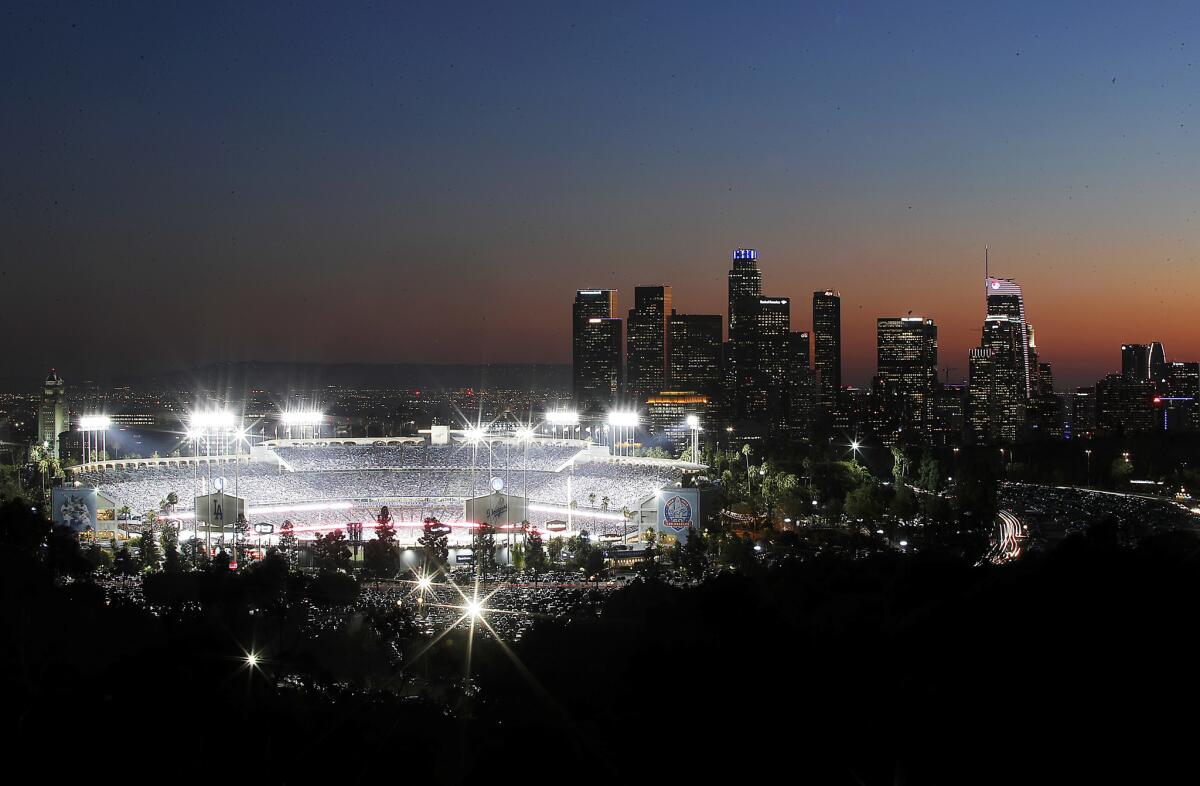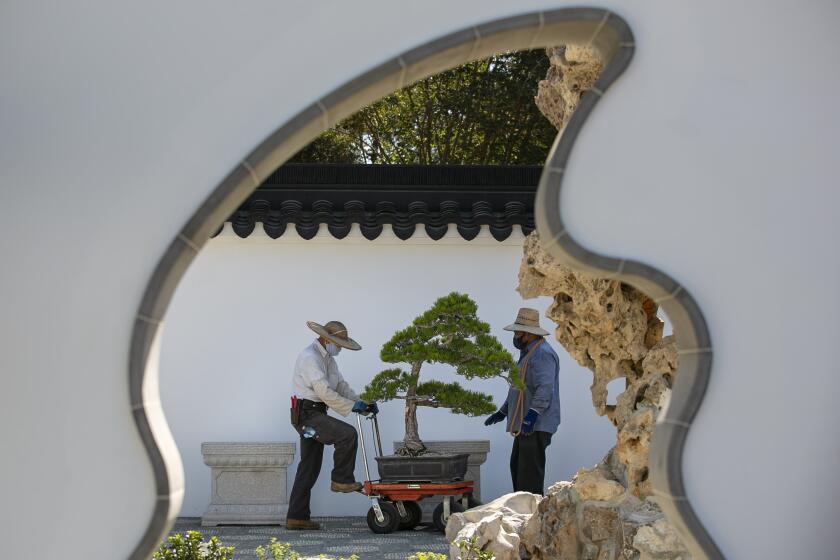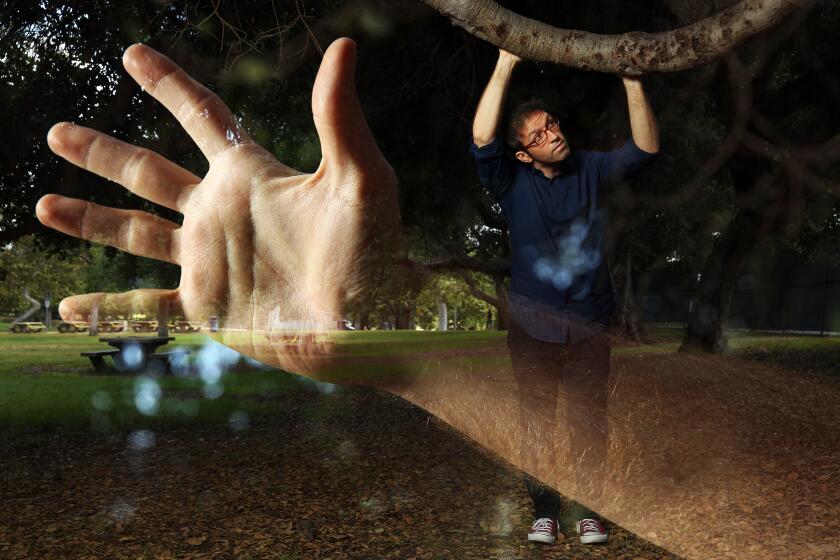Review: Podcast tales from the 90403 (and 90024 and 90012) in ‘The Zip Code Plays’

- Share via
My L.A. theater peeps and I are craving live performance. We’ve found ourselves on Saturday nights watching things we once couldn’t have imagined — “What the Constitution Means to Me” on Amazon Prime, magic shows on Zoom — in places we wouldn’t have been caught on a bet, such as our own houses.
Maybe no screen experience will ever deliver the high we seek, but a thoughtfully produced substitute does seem to take the edge off for a little while or at least remind us that we’re not alone — that somewhere in this shut-down city, behind the boarded-up windows, six feet apart, through personal protective equipment, talented people are looking for creative ways to get us our fix.
For the record:
3:26 p.m. Nov. 23, 2020An earlier version of this article misidentified the roles that Lloyd Roberson II and Bernard K. Addison are playing.
It’s in this generous, therapeutic spirit that Antaeus Theatre Company has launched “The Zip Code Plays,” a series of six short original audio dramas written by members of its Playwrights Lab, performed by actors in its repertory and available as free podcasts. Each punchy episode — the longest is 31 minutes — is inspired by a local ZIP Code, from 90011 (South L.A.) to 90272 (Pacific Palisades), 90403 (Santa Monica), 90024 (Westwood), 91352 (Sun Valley) and 90012 (DTLA).
The series comes with built-in appeal for Antaeus fans, admirers of the lost art of the radio play and aficionados of L.A. history. Listening to the six stories one after another is like taking a whistle-stop tour of the weirder corners of our diverse metropolis, on an unusually comfortable private bus with surprisingly high-quality audio and multiple tour guides who subscribe to a dizzying variety of dramaturgical approaches. You can never be sure if what they’re telling you is fact or fiction or something in between. And you can wear your pajamas.
Some museums have closed, some are open. Drive-in shows are a go, but what about outdoor concerts? A rundown of culture under new COVID-19 rules.
Episode 1, “Speakeasy,” written by Khari Wyatt and directed by Bernadette Speakes, takes place in 1956 and stars Lloyd Roberson II as Leon, a writer returning to L.A. from a year in Paris, where he has been working on a novel. A lot has changed: Not only has his South L.A. neighborhood gotten grittier, but his wife, Bird (Marlow Wyatt), has a new handgun and a new gentleman caller, Daddy August (Bernard K. Addison). They’re definitely up to something, but not what Leon thinks.
Next we’re off to 90272: “Annexing the Palisades,” written by Alex Goldberg and directed by Ann Noble, is probably the most chilling chapter of the collection, based on creepy true history. In 1939, a posh couple (Harry Groener and Nike Doukas) interview a woodcarver (Adrian LaTourelle) at their secluded estate-in-progress on Murphy Ranch. As they tour him around the grounds, they chitchat urbanely about architecture, opera, Germany and the looming war, but the conversation takes a sinister turn when the homeowners reveal why they’re constructing a self-sustaining compound and who they hope will move in.
In Episode 3, Nayna Agrawal whisks us down the coast to Santa Monica with a quirky legal satire, “Plucker,” directed by Jonathan Muñoz-Proulx. Sassy renter Mina (Kavi Ramachandran Ladnier) finds herself on trial before the Santa Monica Flora and Fauna Assn. (portrayed by Marcelo Tubert and Veralyn Jones) for picking a neighbor’s blackberries. Beneath the comic, fast-paced banter, bristling with horticultural puns, lurks a deeper debate about tradition versus diversification in urban neighborhoods.
Deb Hiett then slings us inland to Westwood with Episode 4, “All Information Herein Is Classified,” directed by Carolyn Ratteray. It’s presented as a collection of top-secret FBI recordings related to the investigation of an 80-year-old woman, Eleanor Pender MacAdams (Dawn Didawick), who has developed a passion for joining street protests late in life. We listen in on her phone calls with her daughter, as well as her interviews with the two FBI agents (Bo Foxworth and Catia Ojeda) who keep stopping by to good cop/bad cop her into revealing whether she’s the sweet, dithering, cookie-baking grandma she appears or a dangerous revolutionary. We have all the evidence: Can we solve the case?
In Episode 5, Steve Serpas deposits us in an auto junkyard in Sun Valley with “Salvage,” directed by Julia Fletcher. Marty (Gigi Bermingham), a former music teacher about to go blind, is hunting for a part to fix the car she longs to drive one last time before her license expires. William (Jon Chaffin) is a volunteer sent to help her from the Center for the Blind. It turns out they have history: He was her student 20 years earlier. But while William is eager to catch up and reconnect, Marty keeps him at arm’s length. What’s up with them? Honestly I’m still not sure. But at least I got to hear Bermingham sing.
This week’s roundup features an audience survey, the impact of the pandemic on museums, and an artifact from Alcatraz.
Finally, in the honorable tradition of saving the weirdest for last, we arrive at Episode 6: 90012. The DTLA story is the trippy “Clara and Serra and the Talking Bear,” written by Angela J. Davis and directed by Steven Robman. It’s a conversation among three statues come to life: the trailblazing public defender Clara Shortridge Foltz (Abigail Marks); a massive ice age short-faced bear, Arctodus (Luis Kelly-Duarte); and Father Junipero Serra (Tony Amendola). They good-naturedly support one another through the trauma of reincarnation, dispatching an astonishing amount of exposition along the way, but the mood darkens when Clara and Arctodus start taking Father Serra to task for enslaving, abusing and erasing the culture of the native Californians in his avidity to establish the missions. Finally they get a drink together at a rooftop bar, where Father Serra agrees to solve L.A.’s homeless crisis as penance.
Yes, they’re odd, these “Zip Code Plays,” but they’re also quick and fun and surprising, and the production quality is exceptional: Jeff Gardner, audio producer, sound designer and foley artist, and sound editor Adam Macias give us silky, crystal-clear voices and subtle ambient noise, while Ellen Mandel’s charming original music sets the mood for each scene. The vocal performances are delightful, their undeniable hamminess perfectly in keeping with the radio-play format. And in his appealing introductions, velvet-tongued host Ramon De Ocampo shares behind-the-scenes tidbits about Antaeus’ history and how this series was developed and produced in quarantine. Spoiler: It took a lot of work!
'The Zip Code Plays'
Where: Listen at antaeus.org/plays-events/zipcode-plays/ or download on any major podcast platform
Cost: Free
Running time: Each of the podcasts runs 15 to 30 minutes
More to Read
The biggest entertainment stories
Get our big stories about Hollywood, film, television, music, arts, culture and more right in your inbox as soon as they publish.
You may occasionally receive promotional content from the Los Angeles Times.












